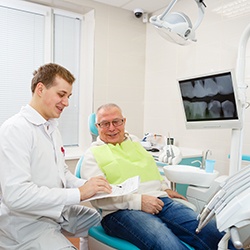TMJ Treatment – Fairfax
Relieve Your Popping, Painful Jaw

Has your jaw been popping, clicking, or hurting when you chew your food or open your mouth? Do you have frequent morning headaches and earaches? This could be a result of temporomandibular joint (TMJ) disorder, also known as TMD. This is when the jaw joints aren’t functioning properly, leaving you with numerous uncomfortable symptoms. At Fairfax Dental Group, we offer a couple TMJ treatment options to give you some relief. Continue reading to learn more about TMD and how we can help!
What Is TMJ Disorder?

Your TMJ is a set of small hinges located in front of your ears. This joint is what allows your lower jaw to move up and down when you speak, laugh, and talk. The TMJ is one of the most complex joints in the body, so it can be disturbed by a misaligned bite, teeth grinding, and other factors. When the TMJ is disturbed, this is called TMJ disorder.
Symptoms of TMJ Disorder

There are various symptoms of TMD. Here are some of the most prominent ones that are experienced:
- Headaches: One of the most underdiagnosed causes of frequent headaches is TMD. The jaw muscles become tense, strained, and overworked, so it is easy for this to affect nearby muscles in the head.
- Ear Pain: Since the TMJ is located next to the ears, having a dysfunctional joint can easily result in ear pain. It can also cause ringing in the ears, known as tinnitus.
- Face/Jaw Pain: Jaw stiffness and pain are the most common symptoms of TMD. It can be difficult to chew comfortably, and lockjaw is very common.
- Bruxism: Teeth clenching and grinding can be caused by daily stress, a misaligned bite, and TMD. It usually happens during sleep and can overwork the jaw muscles, leading to additional pain.
Types of TMJ Treatment
Depending on the cause of your TMD and how severe it is, there are various treatment options available. Here are the ones that we offer.
Occlusal Splint

An occlusal splint is a customized orthotic device that is worn to reduce the prevalence of TMD symptoms. Every device is a little bit different and is worn during sleep. It works by shifting the teeth into the ideal position to relieve your joints of additional strain and stress. It can also reduce the harmful effects of teeth grinding and clenching.
Equilibration/Occlusal Adjustment

If your TMD is the result of bite misalignment or an improperly placed restoration, we might suggest occlusal adjustments. During this time, we will strategically and gently reshape your teeth so that they come together in a more functional manner that doesn’t cause your joints to be strained. Ultimately, this will allow the teeth to come together correctly, the jaw muscles to relax, and TMD symptoms to subside.

